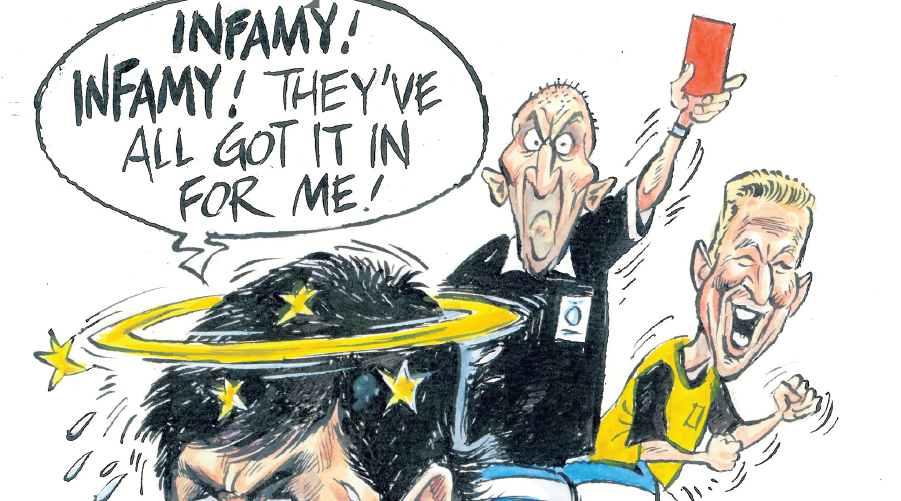In 2002, a cadre of 38 English referees took part in an experiment that Sheffield Wednesday‘s Fernando Forestieri may wish to study during his fortnight on the sofa.
Split into two groups, the officials were presented with 50 video clips of two teams challenging for the ball, then asked what action they would take.
Given that both teams hailed from Argentina, neither group possessed any prior knowledge of the players involved.
Both groups were furnished with an information pack about both sides, identical in all but one key aspect: Group A were told that Boca Juniors (the blue team) had a reputation for foul and aggressive play.
You can guess what transpired. When the results were tallied, both groups gave the same number of decisions against Boca. But when it came to red and yellow cards, Group A doled out almost 50 per cent more.
Reputation matters. It’s a lesson Forestieri found out the hard way when he was sent off for simulation last weekend.
Hull skipper Michael Dawson ploughed straight into Forestieri’s right leg, even holding his hands up in penitent admission.
But, like the Terminator spying Sarah Connor, ref Tim Robinson marched straight to the prone Forestieri and brandished a second yellow – the second time in as many games that the Argentine has been dubiously dismissed for play-acting. He will now miss two matches.
Wednesday fans are apoplectic at the loss of their top scorer and, in one sense at least, their rage is justified.

Namely, that the rule stipulating only straight red cards can be appealed is nonsense. A red card is a red card no matter how the referee arrived at his decision. A ban is still a ban.
Why should one player get a second chance while another gets a shrug of the shoulders? It isn’t fair – and fairness is the bedrock of any sporting competition.
Of course, nobody wants to see every red card appealed. That would be a nightmare. But an extra game ban for every upheld decision should be enough to deter the chancers.
Still, while I agree that Forestieri should be exonerated, I struggle to sympathise with those castigating Robinson for leaping to judgement.
Yes, he made a mistake. But let’s not pretend Forestieri is a paragon of virtue. Even the most ardent Wednesday fan must admit that the striker is prone to the odd triple salko or thespian tumble.
Just ask Wolves‘ Bakary Sako, dismissed last season after Forestieri collapsed clutching his face for no reason whatsoever.
Is Forestieri the only diver around? No. And it doesn’t make what happened last weekend right. But it does make Robinson’s reaction understandable.
Referees talk. They watch videos. Howard Webb spent between five and seven days before every match studying the tricks and traits of the players he’d be tasked with controlling.
Reputation matters. And everybody – you, me, referees – will fall back on preconceptions or rules of thumb when making split second or difficult decisions. It’s human nature.
Think about it. If a pink-shirted, brylcreemed estate agent tells you his mortgage broker is the best in the business, do you sign on the dotted line right there and then? No way. You don’t know the guy from Adam but you do know estate agents are untrustworthy. Is this prejudiced? Yes, but most people would call it wise. Robinson was making a similar judgement call.
Of course, if video technology could be invoked to help referees, the problem of split-second decisions would be eliminated. Reputations would cease to matter.
Right now, preconceptions are here to stay, and the moral of the story is as old as Aesop. If you don’t want a reputation, don’t cheat in the first place. Otherwise, you have no right to whinge about the inevitable consequences.
















